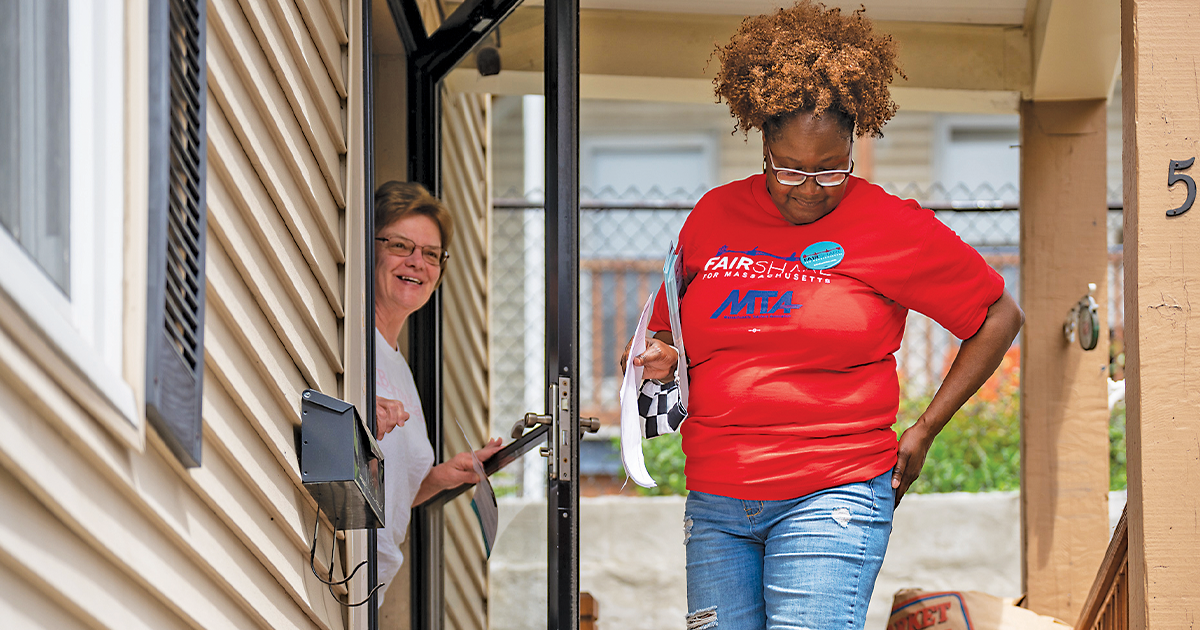According to financial disclosure filings for the 2022-2023 fiscal year, the National Education Association (NEA) spent a whopping $126.3 million on politics, $4 million of which was given to the far-left activist coalition “Raise Up,” to pass a ballot question in the state of Massachusetts.
Teachers may be surprised to learn that while the NEA has a state chapter in Massachusetts, the Massachusetts Teachers Association (MTA), dues used to fund this ballot question were collected from NEA members across the country. This is due to the structure of NEA and its affiliates. Known as “unified dues,” members of a local union are also simultaneously members of their state and national-level unions, and the dues they pay each month are divided between all three unions.
With dues climbing precipitously each year, an estimated 84.4% of dues collected at the local level in Massachusetts are funneled directly to the MTA and NEA, according to a new report from the Pioneer Institute.
Given that the NEA spent less than 7% of its operational budget on local representational activities nationwide, this vast centralization of wealth has allowed the NEA to significantly influence policies and politics in key states like Massachusetts.
During the November 2022 election, 52% of Massachusetts voters narrowly approved the NEA funded “Fair Share” ballot question, which asked voters:
To provide the resources for quality public education and affordable public colleges and universities, and for the repair and maintenance of roads, bridges and public transportation, all revenues received in accordance with this paragraph shall be expended, subject to appropriation, only for these purposes. In addition to the taxes on income otherwise authorized under this Article, there shall be an additional tax of 4 percent on that portion of annual taxable income in excess of $1,000,000 (one million dollars) reported on any return related to those taxes. To ensure that this additional tax continues to apply only to the commonwealth’s highest income taxpayers, this $1,000,000 (one million dollars) income level shall be adjusted annually to reflect any increases in the cost of living by the same method used for federal income tax brackets. This paragraph shall apply to all tax years beginning on or after January 1, 2023 .
According to the MTA’s newsletter, the union was involved in garnering the 271,000 signatures needed to get “Fair Share” on the ballot in 2022: “the MTA is a member of the Raise Up coalition, and public educators played an active role in gathering the signatures.”
In most states, signature gathering is considered a political activity, as petitioners must engage with voters to gain enough signatures that the constitutional amendment can be added to the ballot as a question.
During the signature gathering process and leading up to the election, the MTA and Raise Up told voters that the Fair Share amendment would increase tax revenues by $2 billion annually. Voters were also told this money would be used for public education and crumbling transportation infrastructure, paid for by the wealthiest residents.
Raise Up published a Fact Sheet describing the initiative which said:
For years, the highest-income households in Massachusetts – those in the top 1 percent – have paid a smaller share of their income in state and local taxes than any other income group, while benefiting from repeated federal tax cuts. Our wealthiest residents can clearly afford to pay a little more to fund the investments we all need.
And while countless people and small businesses suffered during the COVID-19 crisis, wealthy executives and investors saw their incomes skyrocket. It’s time for million-dollar earners to pay their fair share to support our economic recovery and the public services we all depend on.
Upon its passage, “Fair Share” altered the state’s constitution by adding a 4% tax increase on income exceeding one million dollars. This tax increase also includes one-time revenues such as the sale of a home or estate inheritance.
MTA and Raise Up failed to properly disclose to its members and voters alike that only the legislature and the governor have the authority to appropriate specific funds.
Since the ballot question was approved, the state’s finances have stumbled hard with no signs of easing. According to a Department of Revenue report sent to the legislature in January, the state is facing a $1 billion shortfall for fiscal year 2024, which ends on June 30. In addition, total year-to-date tax collections through January 12 were nearly 1 percent lower than for the same period last year.
Among the 66 line item cuts made in an effort to balance the budget, the steepest cuts relate to healthcare, veterans’ services, firefighters, emergency aid for elderly and disabled children, community college grants, and the transportation trust fund. As of December, the legislature has announced that a mere $100 million generated by Fair Share revenues would be split between the 351 municipalities in the state.
Are you an NEA member, frustrated that your dues are being spent without your approval? We would love to hear from you at info@AFFT.org
